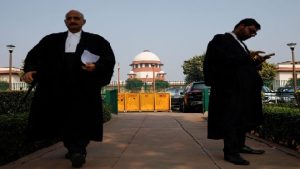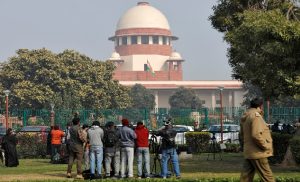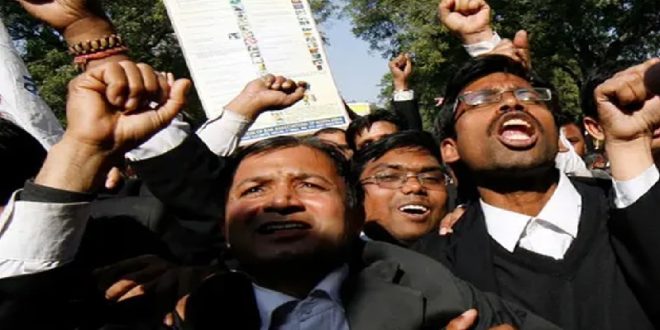17-07-2024
Bureau Report + Agencies
NEW DELHI: Thousands of lawyers in India’s capital protested on Monday against an overhaul in criminal legislation by staying away from work and boycotting court hearings, as opposition mounted to the changes.
Many have been angered by new laws that came in on July 1 expanding police powers to keep people in pre-trial detention and requiring judges to issue written rulings within 45 days of the end of a trial.
 Prime Minister Narendra Modi’s government has defended the changes which also include the death sentence for gang rape of women under 18 saying they are “victim-centric”, modernize the system and “end the endless wait for justice” but lawyers’ bodies, opposition parties and activists have called for a pause, saying the changes will give excessive powers to the police and pile pressure onto an already overburdened justice system as lawyers try to interpret and challenge the new legal provisions.
Prime Minister Narendra Modi’s government has defended the changes which also include the death sentence for gang rape of women under 18 saying they are “victim-centric”, modernize the system and “end the endless wait for justice” but lawyers’ bodies, opposition parties and activists have called for a pause, saying the changes will give excessive powers to the police and pile pressure onto an already overburdened justice system as lawyers try to interpret and challenge the new legal provisions.
Lawyers in seven district courts around New Delhi took part in the strike on Monday, N.C. Sharma, the spokesperson of the All District Courts Bar Associations of Delhi, said.
“Lawyers are protesting because the changes will create confusion,” he added.
New Delhi’s Patiala House district court was much quieter than usual on Monday when Reuters visited. One court official, speaking on condition of anonymity, said many cases were not argued and lawyers sought adjournments.
The Supreme Court of India and the High Court continued to operate normally.
India’s overhaul of its decades-old criminal justice system has come under criticism from some lawyers and activists who say the changes could increase police powers over citizens and increase case backlogs in an overworked system.
The new criminal laws replace the Indian Penal Code of 1860, the 1973 Code of Criminal Procedure and the Indian Evidence Act of 1872, and came into effect last week.
* Court have to issue rulings within 45 days of completion of arguments, unlike earlier when no such time period was defined and led to prolonging of cases. Similarly, charges in a trial have to be framed within 60 days of the first hearing.
 * Police investigation in offences against women and children has to be completed within two months.
* Police investigation in offences against women and children has to be completed within two months.
* The maximum punishment – the death penalty – has been prescribed for offences such as gang rape of a woman aged under 18 and mob lynching.
* The government says sedition clauses have been abolished but a new clause punishing “acts endangering sovereignty, unity and integrity of India” has been created, which critics call a rehash of the controversial sedition law.
* Also allowed are trials in absentia for grave offences – a situation when the police is unable to trace the accused. The judge can rule on such cases and the punishment will be carried out once the person is found.
* Police raids and seizures will need to be mandatorily videotaped and forensic experts have to mandatorily visit a crime scene for serious offences.
* The new laws recognise digital records such as e-mails, server logs, messages, location and voice mails as evidence during a trial.
* Community service is introduced as an alternate to jail for offences like defamation and some other petty offences.
India replaced colonial-era criminal laws with new legislation on Monday, which Prime Minister Narendra Modi’s government said would make the country more just, but the opposition said risked throwing the criminal justice system into disarray.
 Pressmediaofindia
Pressmediaofindia




